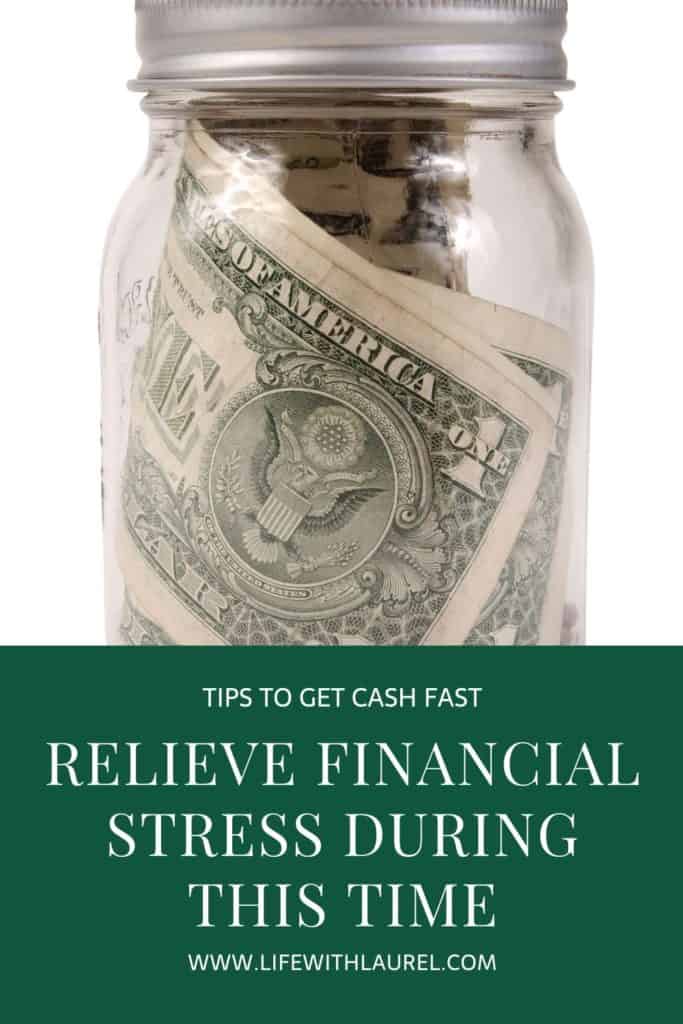Financially Stressed Because of the Coronavirus Pandemic?| Here Are Some Ways To Get Cash Relief
Eventually the economy and stock market will recover and the pandemic will be contained. Although historically the market has bounced back in the past, many are struggling to make ends meet and need cash now to pay their bills. Most people are financially stressed because of the Coronavirus and need cash relief
If you make the right decisions in the coming weeks and months, this pandemic won’t have to ruin your plan of retiring when you want to. Congress has also passed an Act that may aid others who are struggling during this time and your Social Security benefits are remaining strong.
Adjust Your Lifestyle
Many people have been laid off either temporarily due to the impact of COVID19. There are a few things that you can do now if you are concerned about your financial wellbeing and are concerned about your retirement account. Once you return to work you can ramp up your contribution. You can easily make up for a few months of not contributing at all.
Focus on not racking up too much debt in the coming months. The more debt that you incur now, the more difficult it will be to pay down once your financial situation is better. Putting expenses on your high-interest credit cards is probably not the best plan. Try to adjust your lifestyle now and in the months to come to cut back on expenses.
Cut Back on your spending
Ask yourself if you really need something or can you make do with what you have for now.
Tap Into Unemployment Benefits
Be sure to take advantage of unemployment if it applies to you. Each state is different in how you apply.
Withdraw From Your Emergency Fund
If you have an emergency savings fund, withdraw what you need. I would consider this an emergency and that is what that fund is for. You will have time to replenish it once things get back on track. Just be sure to only take what you truly need after you have adjusted your lifestyle.
Cash In On Your Stimulus Check
Check on the status of your stimulus check and see how much you qualify for. This will be a relief to many whether you were laid off or not.
Be Content At Home
The good thing about the coronavirus is it is forcing us to spend less because we are staying at home. We aren’t shopping, going out to dinner, or even filling the gas tank. Find ways to be content at home. Be sure to stick to this philosophy once the shops open back up until you are caught back up financially. This forced new lifestyle might even allow you to save more in the months to come if you continue!
Defer Payments On Your Student Loans
The Department of Education made a decision in April that federal student loan borrowers will be allowed to hit pause on their payments for two months. During that time, interest will be waived. That’s important because, under normal circumstances, student loans under forbearance continue to accrue interest while they’re not being paid. Keep in mind that those two months of paused loan payments will be tacked onto the end of your loan.
By following the above guidelines, you can escape the next few months debt-free. But what if that isn’t enough? Don’t give up hope, here are some other ideas for those with a mortgage or retirement fund.
Borrow Some Money to Relieve Financial Stress From Coronavirus
Before resorting to charging expenses on a high-interest credit card consider other options. If you need to borrow money to get you through this rough patch then consider a home equity loan or personal loan. These loans are at a much lower interest rate and can help you through.
Should I sell my stocks?
Everyone is up in arms about the uncertainty of the stock market during these times. Now is the time to be steadfast and evaluate your portfolio. It may also be a good time to make some purchases if you can. One thing to remember is you haven’t made or lost anything until you sell it. We don’t know the recovery time table, but historically we have always recovered.
Evaluate Your Portfolio
Evaluating your portfolio would be a good thing to do though. When looking at your portfolio ask yourself these questions.
Did the pandemic hurt this company’s ability to thrive again once the pandemic is under control? Starbucks and major retailers will more than likely bounce back after the crisis is over. Hold onto these.
Has consumer behavior changed in a way that will endanger the long term survival of the company? Think about companies where it will take a long time to recover or may never recover like cruise lines. If some of your portfolio falls into this category you may consider selling these and walk away from them.
Remember that you are an investor, not a trader. Don’t sell your stock out of fear to cut your losses unless they fall into the second criteria.

New Coronavirus Aid, Relief, and Economic Security Act To Help Relieve Financial Stress
Congress just passed the Coronavirus Aid, Relief, and Economic Security Act which may help those struggling financially during this pandemic. Tapping into these retirement fund benefits should be a last resort as it may affect your long term financial goals. However, if you are in dire need of cash these can be a lifesaver! Here are some changes this act allows.
You Can Borrow Against Your 401(k) And Repay Later
Typically one can only borrow $50,000 or 1/2 of the amount of your retirement fund (whichever is less) and then pay back that amount within five years.
With the new act, you can now borrow 100% of your vested balance up to $100,000 and have an extra year to pay it back.
This option is the least disruptive to your 401(k) benefit and keeps your retirement savings on track. Just keep in mind that you will repay your loan with interest. Only borrow the minimum amount you need.
Make Withdrawals On Your 401(k) Without Penalties
Another option if you don’t want to pay back your 401(k) is to withdraw your money without penalties. You may now withdraw up to $100,000 without paying the 10% penalty or paying the money back however there are some restrictions for this.
Any early withdrawals must be for COVID19 related expenses. Either you or a family member must test positive for the virus or you must have a financial loss due to the virus such as loss of a job, reduced hours, or quarantine.
Use this form of gaining money as a last resort as it throws off your retirement plan for the future and you will still need to pay income tax on this money. It is easy to want the money now without thinking of the long term consequences.
Income Taxes On Withdrawals Can Be Extended
Even if you qualify to take money from your 401(k) early without the 10% penalty, you will still have to pay income tax of the money withdrawn.
The good news is that with this Act, you can now stretch out the income tax payment for the next three years. Consider what those repayments will do to your budget once you regain employment. Again, this is a blessing if you nowhere else to turn to carry you through.
Retirees Can Delay Taking Required Minimum Distributions
Traditionally seniors must make scheduled withdrawals from their 401(k) and IRA when they are 72. These payments are called Required Minimum Distributions (RMDs). Seniors are required to take these distributions because the government only receives taxes from these when you withdraw your money.
Because of the recession, the new regulation allows retirees to delay taking RMD’s for one year. This gives the stock market more time to recover so you aren’t locked into losses by taking your money when the market is down.
Should I File For Social Security?
Your Social Security benefit is safe and COVID19 is not putting it at risk. If you are coming of Social Security age, looking at this criteria may be of benefit to you.
There is an eight year window of when you are eligible to begin taking out your social security benefits, 62-70. Your benefit amount is calculated based on your 35 highest paid years of wages. The age of when you claim your social security can cause that number to change for the better or worse.
When Is My Full Retirement Age?
Full Retirement Age (FRA) is the age in which you are entitled to your full monthly benefit. This age Depends when you were born. You can file earlier than your FRA, but you’ll lose 6.67% of your benefits per year for the 1st three years and lose 5% of your benefits for every year after that.
So if your FRA is 67, but you claim your Social Security benefits at age 62. You will lose 20% for filing three years early and another 10% for filing an extra two years early. That’s a 30% reduction! AND doesn’t become restored when you turn your FRA. You will receive the amount you originally received monthly for life.
On the flip side, if you delay filing past your FRA you’ll boost them by 8% a year up until you turn 70. That increase will remain in effect for the rest of your life. If your FRA is 67, and you file at 70 you will receive 124% of your social security monthly benefit for the rest of your life.
My suggestion is that you don’t file early unless you have exhausted all other means. If you do need to pull money out, Social Security allows one do over in a lifetime. You would need to cancel the benefit within a year of the filing and pay back the money all at once. Be sure you understand the ramifications before filing. If you want to hold out a little longer and can live comfortably off your 401(k) payments, you can receive even more money by waiting until you are 70.
The Last Thing You Need to Know about Relieving Financial Stress Related to the Coronavirus
This will all end soon and the economy will bounce back. It is a scary time, but by making adjustments and having financial relief will help us to survive and breathe deeper. Start by saving money and adjusting your lifestyle. If you need more, borrow conservatively with the relief plans provided. We will all get through this and come out strong.
Other articles that may help as we navigate our world with the coronavirus
- Best Tips to Have Gratitude With Serendipity During Difficult Times
- Strategies to Work From Home and Be Productive
Submit your tip on how you are dealing with the financial stress of the coronavirus.


